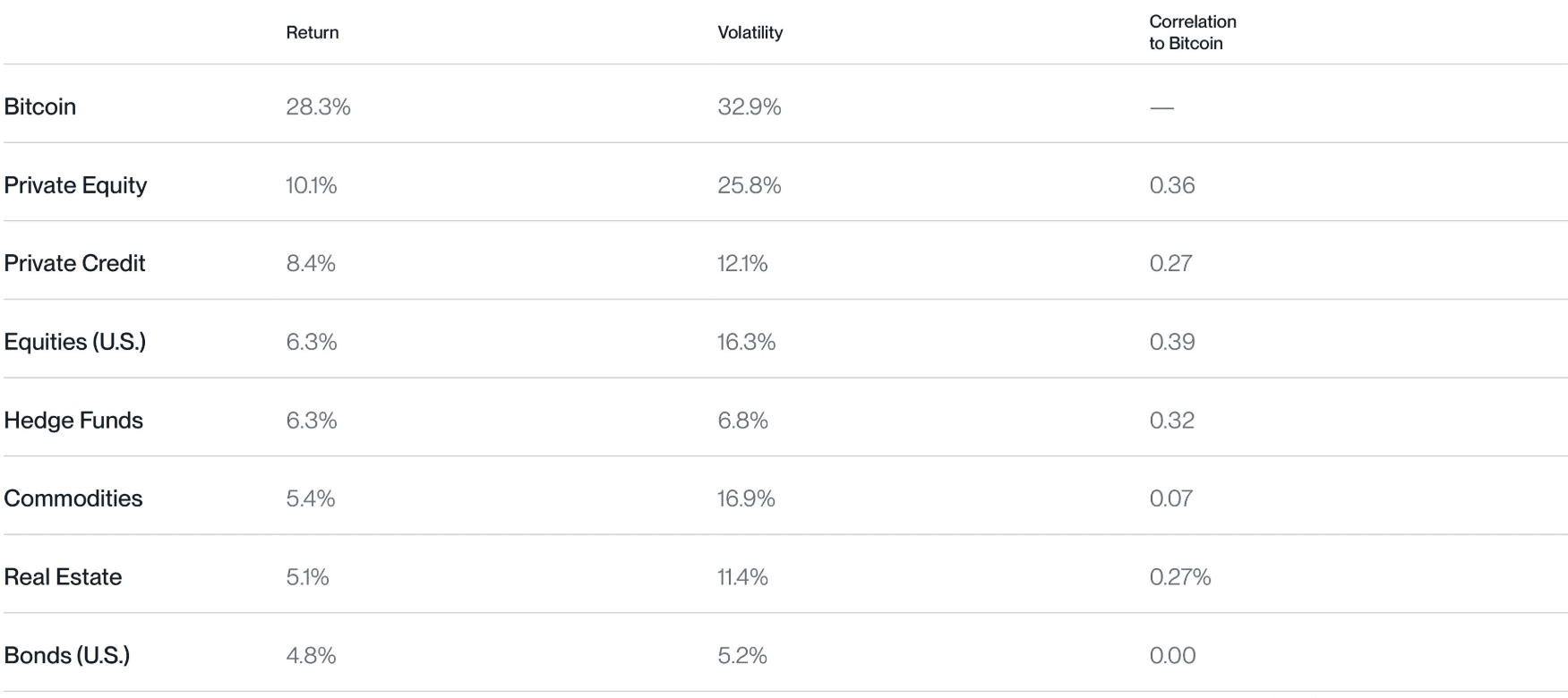Later this week, Bitwise will release an important new research report—the first (Bitwise Bitcoin Long-Term Capital Market Expectations).
This report will predict Bitcoin's returns, volatility, and correlation over the next ten years based on data.
At the end of this memo, I will share a summary of our research findings. But first, I want to tell a little story to illustrate why this report is so important.
Why long-term capital market expectations are crucial
Long-term capital market expectations play a key role in the process of institutional investors building their portfolios.
Every year, major companies on Wall Street and leading asset management firms gather their top talent and vast amounts of data to write in-depth reports predicting future returns for stocks, bonds, real estate, and private credit.
These reports form the foundation for many institutional investors building their portfolios, providing them with core predictions to mix various assets to achieve specific return and risk objectives. They are likely the most important and anticipated reports that most firms publish each year.
Since 2017, Bitwise has been dedicated to helping professional investors seize opportunities in the cryptocurrency space. Below is the number of times large institutional investors have asked us about Bitcoin's long-term capital market expectations each year:
2017: 0 times
2018: 0 times
2019: 0 times
2020: 0 times
2021: 0 times
2022: 0 times
2023: 0 times
2024: 0 times
2025: 12 times
Twelve times may not sound like a lot, but it is actually significant: most of the new requests come from large national account platforms that manage hundreds of billions or even trillions of dollars in assets. Multiply 12 by $500 billion, and you can understand the magnitude of the funds involved.
So, what has changed?
Before this year, we received zero requests for two reasons: 1) Most large platforms had not yet approved Bitcoin Exchange-Traded Funds (ETFs); 2) Professional investors largely viewed Bitcoin as a special, opportunistic investment. The fact that they are now beginning to inquire about long-term capital market expectations indicates a shift in their perspective: Bitcoin is no longer viewed as a one-off investment on the periphery of the portfolio but is starting to be considered for inclusion in the core.
For Bitcoin to mature into a true institutional-grade asset class is by no means an overnight process. It requires hard-won progress in processes and infrastructure, along with the tireless efforts of many individuals. This process truly began with the launch of the spot Bitcoin ETF in January 2024, gaining momentum this year as these ETFs gradually received approval on national account platforms, and it is accelerating as these platforms begin to incorporate Bitcoin into their model portfolios.
But there is no doubt: all of this is happening, brick by brick, becoming a reality.
What are Bitwise's research findings?
Okay, that's enough of the introduction. What does our research actually indicate?
I won't give everything away; you'll have to read the full report yourself. But I can reveal a little bit first.
Through conservative analytical methods, we predict that Bitcoin will be the best-performing major asset globally over the next 10 years, with a compound annual growth rate of 28.3%, and volatility will steadily decline (though still at a high level). The table below provides context for our predictions by comparing them with forecasts for other asset classes from firms like JPMorgan and BlackRock.
2025 to 2035 forecast: Bitcoin's returns, volatility, and correlation with major asset classes

Bitcoin's return and volatility forecasts are made by Bitwise. Forecasts for other asset classes are averages of estimates from capital market reports by JPMorgan, PIMCO, BlackRock, and Vanguard, which may be based on different indices and date ranges.
The specifics of various asset classes are as follows: Bitcoin: Bitcoin spot price. Commodities: Deutsche Bank DBIQ Optimal Yield Diversified Commodity Index Total Return. Gold: Gold spot price. Hedge Funds: Bloomberg Macro Hedge Fund Index. Private Credit: Indxx Private Credit Index. Private Equity: S&P Listed Private Equity Total Return Index. Real Estate: Morgan Stanley Capital International US Real Estate Investment Trust Index Total Return. US Bonds: Bloomberg US Aggregate Bond Index. US Stocks: S&P 500 Total Return Index. Note: Traditionally, a correlation between -0.5 and 0.5 is defined as 'low' or 'no' correlation.
For more details and the quantitative and qualitative analysis supporting our data, please read the full report.
BTC BTH PEPE CETUS


